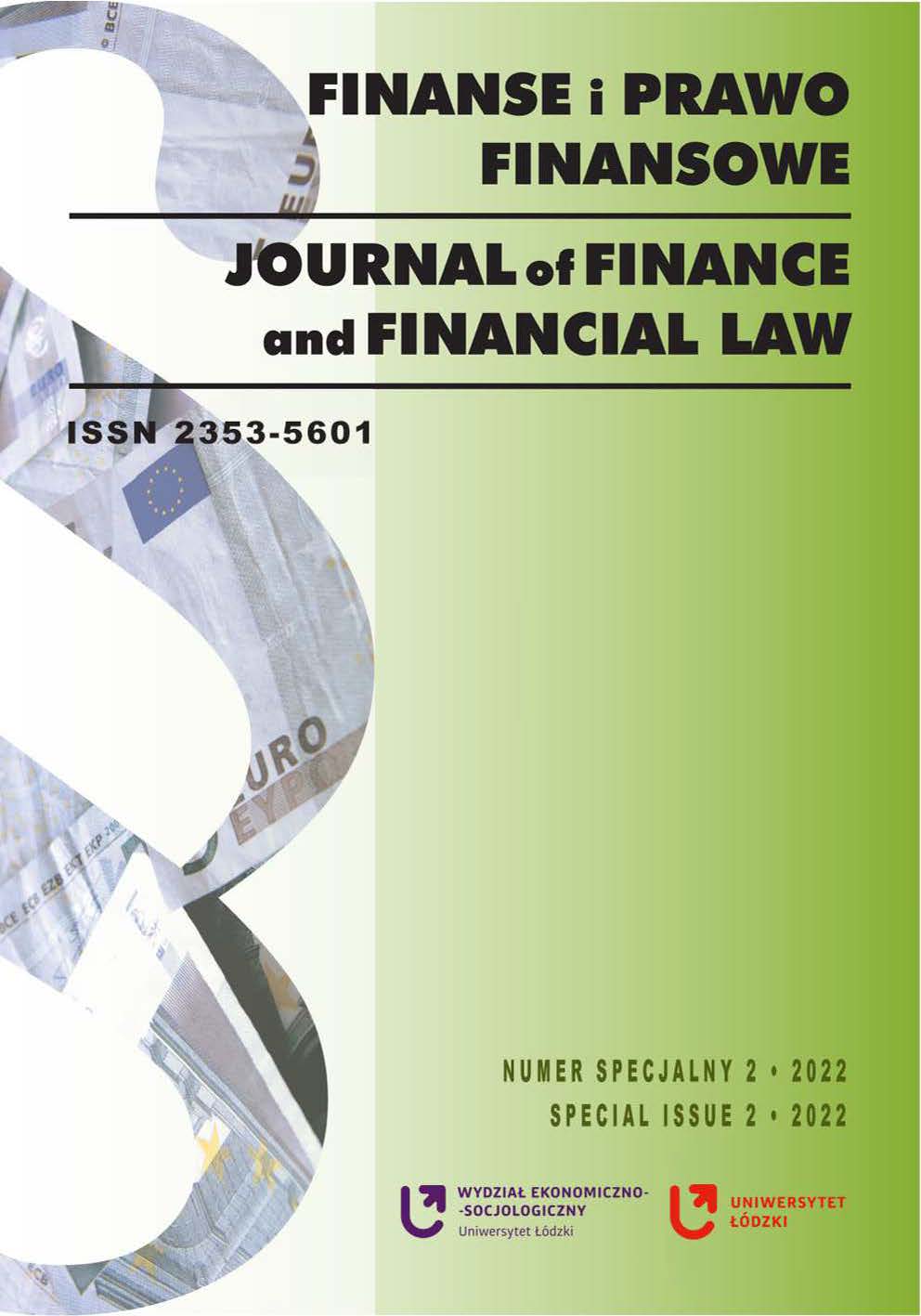Tax Fraud on the Example of Issuing Fictitious VAT Invoices
DOI:
https://doi.org/10.18778/2391-6478.S2.2022.01Keywords:
tax, taxpayer, tax obligation, tax fraud, invoices, abuseAbstract
The purpose of this article. In the literature, you can find quite extensive studies on value added tax, while the issue of tax fraud on the example of issuing fictitious VAT invoices from the perspective of the effect of Art. 56 § 1 of the Act of September 10, 1999 – Fiscal Penal Code has been treated quite fragmentarily. The main research objective of this study is to characterize the impact of the above-mentioned legal regulation in determining the scope of its impact on the tax law system. The work will prove that it is actually unjustified to maintain the current structure of the model of the right to deduct this tax. In connection with the above, the aim of the work will be to assess the directions of changes in the analyzed institution against the background of the applicable legal provisions.
Methodology. It was created on the basis of an analysis of the content of legal acts and documents as well as studies of the subject literature.
The result of the research. The taxpayer should not be held responsible for unlawful actions of third parties with regard to the fulfillment of the tax obligation in the tax on goods and services. Based on the considerations, it can be concluded that as long as the current structure of the model of the right to deduct tax on goods and services is maintained, this issue will still remain open.
Downloads
References
Bartosiewicz, A. (2020). VAT. Komentarz 2020. Warszawa: Wolters Kluwer Polska.
Google Scholar
Bartosiewicz, A. i Kubacki, R. (2004). VAT. Komentarz. Kraków–Warszawa: Wolters Kluwer Pol-ska.
Google Scholar
Dyrektywa 2006/112/WE z dnia 28 listopada 2006 r. w sprawie wspólnego systemu podatku od wartości dodanej, t.j. Dz.U.UE seria L 2006, nr 347 ze zm.
Google Scholar
Grzegorczyk, T. (2006). Kodeks karny skarbowy. Komentarz. Warszawa: Wolters Kluwer Polska.
Google Scholar
Kardas, P., Łabuda, G. i Razowski, T. (2012). Kodeks karny skarbowy. Komentarz. Warszawa: Wolters Kluwer.
Google Scholar
Kardas, P., Łabuda, G. i Razowski, T. (2017). Kodeks karny skarbowy. Komentarz. Warszawa: Wolters Kluwer Polska.
Google Scholar
Karwat, P. (2003). Obejście prawa podatkowego. Warszawa: Dom Wydawniczy ABC.
Google Scholar
Konstytucja Rzeczypospolitej Polskiej z dnia 2 kwietnia 1997 r., t.j. Dz.U., nr 78, poz. 483 ze zm.
Google Scholar
Ladziński, A. (2019). Zmiany w ogólnej klauzuli przeciwko unikaniu opodatkowania – powrót do przeszłości. Przegląd Podatkowy, 1.
Google Scholar
Łętowska, E. (2012). Wstęp. W: E. Łętowska, K. Sobczak, red., Rzeźbienie państwa prawa. 20 lat później. Ewa Łętowska w rozmowie z Krzysztofem Sobczakiem. Warszawa: Wolters Kluwer Polska.
Google Scholar
Oczkowski, T. i Zgoliński, I. (2020). Obowiązek zapłaty podatku a instytucja przepadku w prawie karnym skarbowym. Rozważania o wzajemnej spójności systemowej. Teka Komisji Prawniczej PAN, XIII(2).
Google Scholar
Ożóg, I. (2017). Przestępstwa karuzelowe i inne oszustwa w VAT, Warszawa: Wolters Kluwer Polska.
Google Scholar
Pęczek-Czerwińska, J., (2016). Prewspółczynnik odliczenia VAT naliczonego. Warszawa: Wolters Kluwer Polska.
Google Scholar
Sachs, K. i Namysłowski, R. (2008). Dyrektywa VAT. Komentarz, Warszawa: Wolters Kluwer Polska.
Google Scholar
Selera, P. (2014). Prawo do odliczenia i zwrotu podatku naliczonego w VAT. Warszawa: Wolters Kluwer Polska.
Google Scholar
Szymczyk, J. (2022). Ewolucja koncepcji nadużycia prawa w dziedzinie VAT. Zeszyty Naukowe Sądownictwa Administracyjnego, 2(101).
Google Scholar
Ustawa z dnia 10 września 1999 r. – Kodeks karny skarbowy, t.j. Dz.U. 2021, poz. 408 ze zm.
Google Scholar
Ustawa z dnia 11 marca 2004 r. o podatku od towarów i usług, t.j. Dz.U. 2021, poz. 685 ze zm.
Google Scholar
Ustawa z dnia 13 maja 2016 r. o zmianie ustawy – Ordynacja podatkowa oraz niektórych innych ustaw, Dz.U. 2016, poz. 846.
Google Scholar
Ustawa z dnia 23 października 2018 r. o zmianie ustawy o podatku dochodowym od osób fizycznych, ustawy o podatku dochodowym od osób prawnych, ustawy – Ordynacja podatkowa oraz niektórych innych ustaw, Dz.U. 2018, poz. 2193.
Google Scholar
Ustawa z dnia 29 sierpnia 1997 r. – Ordynacja podatkowa, t.j. Dz.U. 2021, poz. 1540 ze zm.
Google Scholar
Ustawa z dnia 6 czerwca 1997 r. – Kodeks karny, t.j. Dz.U. 2021, poz. 1023 ze zm.
Google Scholar
Wyrok NSA w Warszawie z 10.10.1997 r., III SA 779/97, LEX nr 34424.
Google Scholar
Wyrok NSA we Wrocławiu z 9.02.2000 r., I SA/Wr 1885/99, LEX nr 47924.
Google Scholar
Wyrok NSA z 11.10.2018 r., I FSK 1865/16, CBOSA.
Google Scholar
DOI: https://doi.org/10.1007/s35725-018-0038-7
Wyrok NSA z 14.02.2019 r., I FSK 2356/18, LEX nr 2641636.
Google Scholar
Wyrok NSA z 24.05.2021 r., I FPS 1/21, CBOSA.
Google Scholar
Wyrok NSA z 29.05.2013 r., I FSK 1075/12, LEX nr 1378957.
Google Scholar
Wyrok SN z 5.03.2015 r., III KK 407/14, LEX nr 1678967.
Google Scholar
Wyrok TK z 21.04.2015 r., P 40/13, LEX nr 1668770.
Google Scholar
DOI: https://doi.org/10.4335/13.1.21-33(2015)
Wyrok TK z 22.05.2002 r., K 6/02, LEX nr 54067.
Google Scholar
Wyrok TK z 25.10.2004 r., SK 33/03, LEX nr 127312.
Google Scholar
Wyrok TK z 29.07.2014 r., P 49/13, LEX nr 1491200.
Google Scholar
Wyrok TK z dnia 30.01.2001 r., K 17/00, LEX nr 46003.
Google Scholar
Wyrok TS z 11.04.2012 r., C-138/12, LEX nr 1297082.
Google Scholar
Wyrok TSUE z 12.01.2006 r. w sprawach połączonych C-354/03, C 355/3, C-484/03, LEX nr 165063.
Google Scholar
Wyrok TSUE z 31.01.2013 r., C-643/11, LEX nr 1258614.
Google Scholar
Zgoliński, I. (2012). Wystawienie lub posługiwanie się nierzetelnym dokumentem podatkowym. Prokuratura i Prawo, 3.
Google Scholar
Zgoliński, I. i Oczkowski, T. (2021). Nadużycie przepisów prawa podatkowego a przestępstwo oszustwa podatkowego z art. 56 Kodeksu karnego skarbowego. Przegląd Legislacyjny, 2(116).
Google Scholar
Downloads
Published
How to Cite
Issue
Section
License

This work is licensed under a Creative Commons Attribution-NonCommercial-NoDerivatives 4.0 International License.














